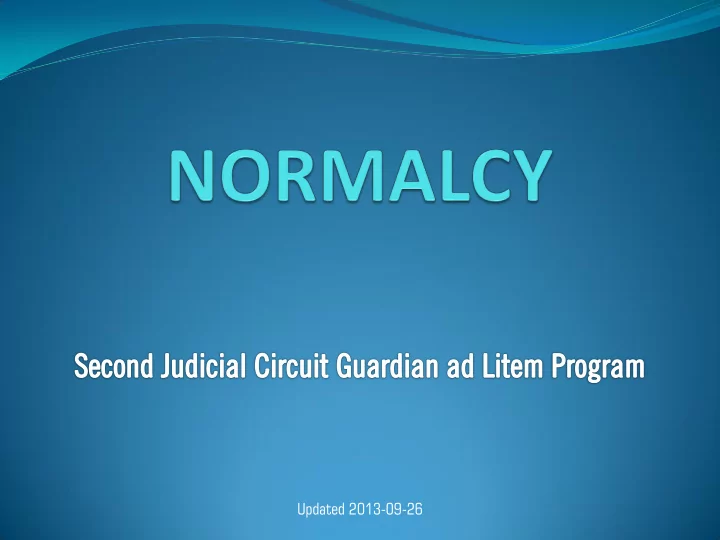

Updated 2013-09-26
What is Normalcy? Normalcy is the right for All Youth in licensed out of home care to have the opportunity for normal growth and development to include age-appropriate activities, responsibilities and life skills. Foster Children should be allowed and encouraged by the licensed out-of-home caregiver and service worker to engage in appropriate social and extracurricular activities to promote the child’s social development and maturity.
What is a Normalcy Plan? A Normalcy Plan is a written plan that must be developed with foster parent or caregiver, the child (13+), and the case manager. The Plan must include specific goals and objectives that promote the child’s participation in activities similar to those of non-foster care children. These opportunities shall not be withheld as a form of discipline The Plan must be reviewed and updated at minimum once a quarter
Written plan should include permission and encouragement for the child to: Engage in appropriate social and extracurricular activities (i.e. staying overnight without needing background checks on the friend, being dropped off at a public destination without adult supervision, dating, receiving an allowance etc.) Obtain employment Have access to phone usage and reasonable curfews Travel with other youth and adults
The Normalcy Plan should also address: Assistance in participating in activities such as: The child having his or her picture taken for publication in a newspaper or yearbook Receiving public recognition for accomplishments Participating in school or after-school organizations or clubs Participating in community events Support of the child’s efforts to learn to drive a car Support efforts to obtain learner's permit and driver’s license Other age appropriate activities and responsibilities
Overnight Outings Overnight outings should be encourage and permitted Criminal, delinquency and abuse/neglect history checks for dating, outings and activities with friends are NOT necessary If the overnight trip exceeds one night it must be approved by the case manager and cannot interfere with visitation The out-of – home caregiver must determine that the overnight outing is safe and appropriate
Allowance All children in foster care, starting at age 6, are to have a minimum allowance, which is NOT to be reduced as a punishment or for disciplinary reasons. Additional money can be provided as a reward for good behavior. Providing toiletries, toys or other tangible items in lieu of money is not permitted. Allowance money should also not include money needed to purchase toiletries. The amount of allowance varies by age and provider but it ranges from $10 to $20 a month.
Driving a Car There should be support of the child’s efforts to learn to drive a car, obtain a learner’s permit and driver’s license Efforts shall be made to obtain automobile insurance If a youth is under 18, the foster parent, a group home employee or CBC caseworker can sign the application for a learner’s driver’s license When they are then eligible for a regular driver’s license, the CBC caseworker can sign that application. However, the caseworker can only sign if getting a driver’s license is part of the transition plan [Fla. Stat.§322.09(4) and (5)]
Foster Parent Liability According to Florida Statute “Provided that the age - appropriate activity is in a written plan developed and signed by the foster parent or caregiver, the child and the case manager, the foster parent shall not be held responsible for, or have the foster care license at risk, as a result of the child’s participation in that age - appropriate activity”. 409.1451(3)(a)3, Fla. Stat (2010)
Confidentiality Confidentiality requirements for Department records shall not restrict the child’s participation in customary activities appropriate for the child’s age and developmental level
What can you do? Obtain and copy of the current normalcy plan Participate in the normalcy planning process Talk with the child about their interests and goals to ensure the normalcy plan addresses these issues Monitor implementation of normalcy plan Transport the child (according to guidelines) to extracurricular activities, outings etc.
Resources Guardian ad Litem http://www.guardianadlitem.org/documents/PracticeBull etinNormalcySummer2011.pdf Department of Children and Families http://www.dcf.state.fl.us/youth/expect.shtml Center for Child Welfare http://centerforchildwelfare.fmhi.usf.edu/il/normalcy/No rmalcyTrainingPacket.pdf
Recommend
More recommend